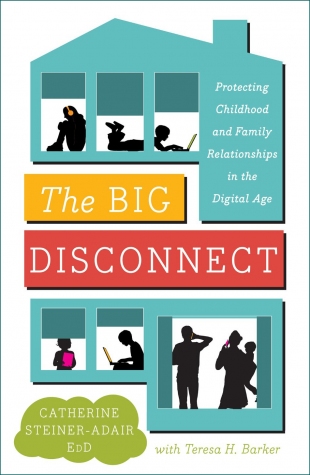Catherine Steiner-Adair is an internationally recognized clinical psychologist, consultant, and educator. She spends her time working as a therapist with children, couples, and families, and as a school consultant, researcher, and speaker. The Big Disconnect is filled with practical suggestions on how to deal with the challenges created by the prevalence of digital technology in both homes and in schools.
Media theorist Henry Jenkins has described our present situation as the "convergence culture" where "changes in communications, storytelling, and information technologies are reshaping almost every aspect of contemporary life — including how we create, consume, learn, and interact with each other." Computers, smartphones, digital tablets, e-readers, and the Internet have taken over in our homes and altered the ways families relate and communicate with each other. According to a 2010 Kaiser Family Report, kids between the ages of 8 and 18 are spending more time on their electronic devices than on any other activity besides (maybe) sleeping — an average of more than seven and a half hours a day. This love affair with tech is, in many cases, mirrored by many parents who are missing in action while carrying on cellphone conversations, texting, or sorting through their e-mails.
Catherine Steiner-Adair is convinced that "the digitized life we now take for granted is taking a far greater toll on family cohesion and childhood itself than we imagine, or perhaps than we want to allow ourselves to imagine." Here are some of the alarming results of so much emphasis on digital devices:
• tech replaces family primacy
• the premature loss of childhood innocence
• the loss of family privacy and the exposure of our vulnerabilities
• the decline of empathy
• the lack of independent, self-generated play
• the erosion of sustained attention
• the diminishment of the art of conversation
With energy, the ambitious author takes us on a tour of childhood beginning with the impact of apps and other devices on the brains of babies; the negative effect of tech on preschoolers; the fast-forward childhood of kids five to ten; and the concerns about teens, screens, temptation, and trouble. Steiner-Adair closes with two top-drawer chapters: one on teens sharing their opinions on how to be a go-to parent in the digital age (being scary, clueless, or crazy are not options) and a final summation on making the most of tech as an ally for closeness, creativity, and community.
The Big Disconnect is highly recommended for plugged-in parents who want to find creative ways of handling family life when everybody is immersed in the digital world.
